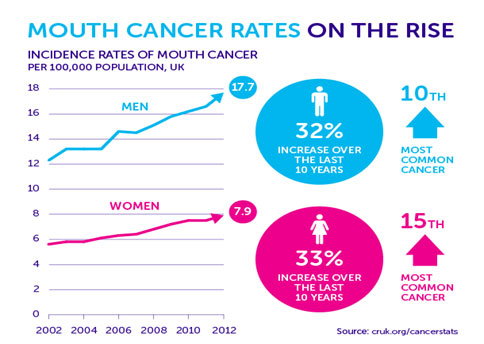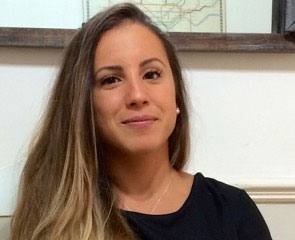by
Lee Waring
| Nov 01, 2017
One of the many reasons why it’s so important to see your dentist on a regular basis

Did you know November is Mouth Cancer Action Month? With oral cancer on the rise, we speak to one of our wonderful dentists, Luisa Aparicio, who explains the importance of visiting your dentist, after discovering oral cancer in a patient.
Luisa, who works in the mydentist practice on Upper Oldfield Park in Bath, has a hectic schedule but feels it’s very important to spend the necessary amount of time with each patient to ensure they’re receiving the highest level of care, stating: “We have a very busy practice, which means we see around 35 patients per day. It can be challenging as every person has their own individual concerns and we have to give all our attention and focus to each person in a short period of time. It can be tiring, but also very gratifying to feel we're able to help so many people. I'm also very lucky to have an amazing nurse who I've worked with for over 4 years and that makes the days much easier and fun.”
Despite her busy days and influx of patients, her attitude to ensuring her patients have her full attention was key in a case with one particular patient, whom she suspected something was wrong straight away. Looking back at their first appointment, she says: “I initially suspected something was wrong back in 2013 when a periodontal pocket didn't improve with periodontal therapy and a big radio lucid area was visible on an x-ray. So, I referred them for a second opinion, where they carried out extraction of several teeth and discharged the patient back to my care.” For Luisa, urgency was of the essence, and as with any suspicion of cancer, the referrals were essential and were urgently sent by fax, post and email.
“On return, I noticed that the socket wasn't healing and re referred the patient urgently to the Maxillofacial Department where finally a biopsy was done, and the diagnosis of oral squamous cell carcinoma (mouth cancer) was obtained.
I kept in touch with the patient by telephone, to check on him and know about his treatment options. The patient had radiotherapy and radical hemisection of the maxilla, and was then fitted with a maxillary obturator prosthesis. I have seen him in surgery recently and he is very positive about the outcome and very grateful that the cancer was detected at an early stage.”
For Luisa, keeping up to date is key in supporting her when instances like this one arise: “One of the subjects in University is dedicated entirely to oral pathology. I've attended conferences where Oral Cancer was a key discussion. We always hope we never have to deal with these situations in real life, but regular updates on the subject truly help and prepare us to be able to identify early signs of malignancy.”
“In practice, we pay attention to any lesion or ulcer that doesn't heal, any hard, not mobile lump with irregular margins that look necrotic or with white borders, any change in colour, shape or texture in the gums, lips, tongue or cheek. Any swelling, painful or not, in the mouth or throat or difficulty swallowing (persistent sensation that there's something stuck in the throat). It’s important that patients regularly check their oral cavity in order to be aware of any changes. Many times, cancerous lesions aren’t painful, so daily oral inspections by the patient and regular check-ups with the dentist are crucial.”
Looking a bit deeper into what people should be looking out for to maintain a healthy mouth, she says: “I think information is key, so I make a point of informing my patients that habits such as smoking and excessive alcohol consumption highly increase the risk of oral cancer. Also, a general healthy lifestyle and diet will provide the body with the best antioxidants and immune boosting agents that destroy diseased cells and invaders such as bacteria and virus.
Visiting the dentist regularly (every 6 months) is mandatory, but it’s also very important that the patients take responsibility for their own health to prevent oral and other types of cancer. So ensure you eat your 7 a day (5 vegetables + 2 fruits), eat animal products in moderation, drink plenty of water, exercise, avoid excessive direct sun exposure, limit consumption of alcohol to a couple of glasses a week and don’t smoke.”
A little bit about Luisa …

Luisa, who has been a dentist for 9 years, qualified in Portugal, where she is from. She decided to move to England to pursue her profession and work for the NHS, as Portuguese dentistry is very private focused, making it less readily available for the general population.
She is passionate about health, wellbeing and natural medicine and is currently studying naturopathic nutrition. This takes most of her free time but when she’s not studying, she enjoys spending time with friends, travelling, spending time in the countryside with her boyfriend and doing yoga.